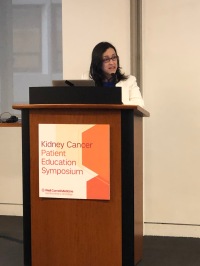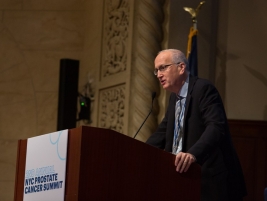We are proud to report another year of meaningful patient connections, exciting treatment developments and continued leadership in the field of genitourinary (GU) oncology.
Check out our team’s 2019 highlights.
NEW FACES
Panagiotis “Panos” Vlachostergios, MD, PhD, has joined our team to grow GU oncology patient care and research at NewYork-Presbyterian Brooklyn Methodist Hospital. This is a significant step in our plan to bring our world-class expertise directly to patients who live in Brooklyn, minimizing their expenses and travel time to Manhattan.
NEW EVENTS

In addition to our digital efforts to inform the patient community of the latest news and cutting-edge advancements in the GU oncology field, we also provide opportunities to learn directly from experts via free educational events. In May, Dr. Ana Molina led our first Kidney Cancer Patient Education Symposium, which allowed kidney cancer patients to connect with one another over information sessions ranging from immunotherapy treatment to anxiety management.

Then, during Prostate Cancer Awareness Month in September, Weill Cornell Medicine and NewYork-Presbyterian Hospital teamed up with Memorial Sloan Kettering Cancer Center and Columbia University Herbert Irving Comprehensive Cancer Center to host over 300 patients, loved ones and healthcare professionals for our 2nd Annual NYC Prostate Cancer Summit. This education and advocacy event was packed with discussions about new therapies and technologies, prostate cancer genetics, post-treatment sexual health and more.
Save the Date!
Please mark your calendar for the 3rd Annual NYC Prostate Cancer Summit on September 12, 2020, and look out for a combined Kidney and Bladder Cancer Patient Education Event in 2021.
NEW RESEARCH DEVELOPMENTS
Bladder/Urothelial Cancer
• A subset of bladder cancers are driven by the FGFR gene. We led accrual of the clinical trial that resulted in U.S. Food and Drug Administration (FDA) approval of the first targeted therapy for bladder cancer, erdafitinib, which targets the FGFR gene. This research was published in the prestigious New England Journal of Medicine.
• Immunotherapy has transformed the treatment of patients with advanced bladder cancer, but, unfortunately, only a fraction of patients respond. Dr. Bishoy Faltas led a seminal publication characterizing urothelial carcinoma that originates in the “upper tract” (center of the kidney and ureter tubes). His paper deciphers why some tumors are less likely to respond to immunotherapy and explores ways to increase response rates.
• Dr. Faltas also led work that identified the genetic mechanisms by which bladder cancers become resistant to chemotherapy and new drug targets. Based on his research, we have launched a trial of an oral targeted therapy for patients who are ineligible or choose not to receive chemotherapy prior to surgery.
• We continue to lead the development of antibody-drug conjugates, which deliver potent chemotherapy preferentially to tumor cells. In this novel therapeutic approach, a monoclonal antibody binds to specific proteins found on cancer cells, allowing the attached drug to target the cancer cells without damaging the patient’s healthy cells. One of these drugs (enfortumab vedotin) was FDA-approved in December 2019, and we are studying new combinations in earlier lines of therapy. We are also leading the pivotal clinical trial designed to get one of these antibody-drug conjugates (sacituzumab govitecan aka IMMU-132) FDA-approved and made widely available to patients. Exciting trial results were highlighted at the 2019 Genitourinary Cancers Symposium and the 2019 Congress of the European Society for Medical Oncology (ESMO).
Prostate Cancer
• Our team is at the forefront of utilizing prostate-specific membrane antigen (PSMA)-targeted therapies in the treatment of prostate cancer, currently one of the most exciting research areas in the field. We anticipate that our clinical trials will lead to FDA approval of at least one drug in the near future.
• Based upon prior work with fractionated dosing of our radiolabeled antibody 177Lu-J591, we performed the world’s first dose-escalation trial of 177Lu-PSMA-617, with results presented at the 2019 ESMO Congress. Our unique dose-dense regimen was well tolerated, with nearly 82 percent of men experiencing prostate-specific antigen (PSA) decline.
• We also completed the dose-escalation portion of the first alpha emitter (225Ac-J591) trial and will soon present the early results publicly. At the end of the year, we were notified of grant funding for an exciting future trial using this approach in combination with immunotherapy.
Kidney Cancer
• As the number of FDA-approved advanced kidney cancer drugs grows, our team remains focused on developing novel drug combinations and identifying which patients should be treated with which therapies in order to achieve the best outcomes. Our goal is to improve responses and decrease resistance to treatment by providing patients with unique combination therapies and genomic-driven targeted agents.
• Dr. Ana Molina is leading an exciting study of the antibody OX40 in combination with axitinib. Clinical and non-clinical observations suggest that combining the OX40 antibody – which stimulates the immune system and may stop cancer cells from growing – with axitinib may produce superior anti-tumor activity compared to one drug alone. This approach is being tested specifically in patients whose tumors have grown despite standard immunotherapy.
Precision Medicine
A major goal of our research is precision medicine, or the tailoring of therapy to an individual patient. Under the direction of Dr. Cora Sternberg, we continue to analyze genomic signatures, or unique tumor “fingerprints,” in patient tissue and blood samples to assess for real-time treatment targets and to discover new mechanisms of resistance to current therapies. A treatment target that we identified in an aggressive subset of disease termed neuroendocrine prostate cancer (NEPC) is making its way into clinical trials. In addition, we are spearheading work to develop organoids (mini 3-D cancer models) from patient tumor biopsies in order to test novel pathways and enhance drug development.
We look forward to persistent progress in 2020 and in the years ahead.
Want more frequent updates from our team? Follow us on social media.
Twitter @cornellGUcancer
Facebook facebook.com/WeillCornellGUCancer